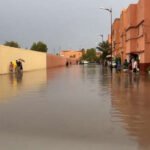Amnesty International (AI) has documented the killing of children by armed groups in conflicts raging at Niger’s borders with Mali and Burkina Faso.
In the report, I Have Nothing Left Except Myself: The Worsening Impact on Children of Conflict in the Tillabéri Region of Niger, the human rights organisation also reported the targeting of children for recruitment by armed groups.
Many children, according to the 57-page report, are experiencing trauma after witnessing deadly attacks on their villages.
Conflict erupted in Mali in 2012, and has since spilled into neighbouring Burkina Faso and Niger.
Armed groups have competed for control in the border areas, and frequently clashed with the Nigerien military, and forces from countries including Chad, Mali, Burkina Faso, and France.
‘In some areas, women and girls have been barred from activities outside the home, and risk abduction or forced marriage to fighters’, the report said.
According to the Armed Conflict Location and Event Data Project, violence against civilians has led to 544 conflict-related deaths between 01 January and 29 July, 2021 in Niger, already exceeding the 397 people killed in 2020.
Amnesty said it spoke to 16 boys who had narrowly survived attacks on their villages. They described how masked attackers on motorbikes opened fire, particularly targeting men and older boys.
‘We all are used to hearing gunshots and to seeing [dead] people layered on top of [dead] people’, the report quoted one boy, aged around 13 or 14, as saying.
The report also noted that fighters fired into homes, killing or injuring civilians attempting to hide.
According to AI, the recruitment of children by Jama’at Nusrat al-Islam wal-Muslimin (JNIM) has increased significantly this year in Torodi department, near the Burkina Faso border.
‘Witnesses said JNIM has targeted younger men and boys aged between 15 and 17, and possibly younger. JNIM members offer incentives such as food, money, and clothes to attract recruits’, it stated.
AI said it recorded symptoms of trauma and distress among children.
‘The Nigerien authorities must take swift action to ensure conflict-affected children across Tillabéri region have access to school and psychosocial care’, AI’s Crisis Response Deputy Director, Matt Wells, said.
‘In Niger’s Tillabéri region, an entire generation is growing up surrounded by death and destruction. Armed groups have repeatedly attacked schools and food reserves, and are targeting children for recruitment’.
Humanitarian agencies have predicted that an estimated 2.3 million people in the region are likely to suffer from food insecurity due to the attacks.
Source: Amnesty International
Photo source: African Studies Library BU




